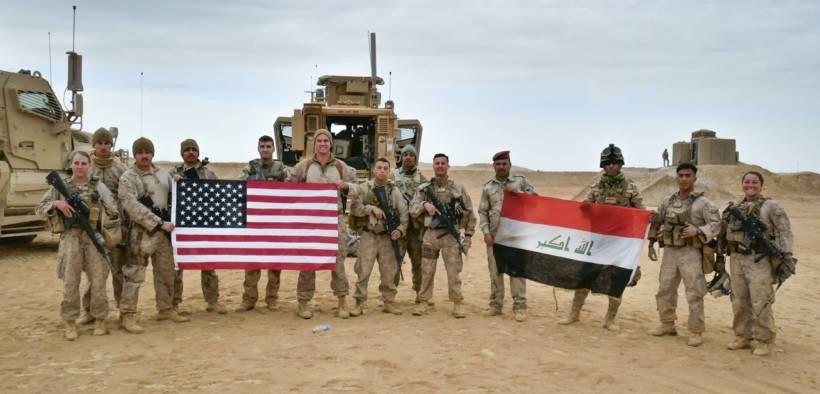ISIS Is Back, And It Has Learnt From Previous Failures

“ISIS has already rebuilt its forces and it’s moving to the offensive … only this time militants are better trained, better equipped, and they are no longer interested in engaging the military in frontal attacks … for us it means ISIS has gone from being dangerous to representing an existential threat.” – Abbas Al Musawi, Baghdad.
Speaking to Citizen Truth in exclusive comments, security expert Abbas Al Musawi warns that Iraq and the broader anti-ISIS coalition may have claimed victory against the terror group much too early, discounting militants’ ability to be restored both in their strength and ability to inflict harm.
“For months Iraq has been monitoring the situation and we have raised the alarm many times with our western allies but to no avail. What I know for certain is that unless a coordinated plan is set in motion soon, we may lose control over large territories and see a spike in attacks across the region.”
Al Musawi’s remarks come on the back of a new UN report addressing efforts made by ISIS militants to free their comrades in arms and ideology from the prisoner camps they have been held in both in Syria and in Iraq.
“ISIS extremists are mounting increasingly bold attacks in Syria and Iraq following their loss of territory in both countries and are planning for the breakout of their fighters in detention facilities,” read the new report.
With over 10,000 ISIS fighters, including 2,000 foreign fighters, awaiting their fate across Syria and Iraq, the possibility of a mass escape would indeed be catastrophic – not only would it allow the group to reconstitute much of its forces but it would demonstrate the ability of ISIS’ new leader, Abu Ibrahim al-Hashemi Al-Qurayshi, to lead his men to victory.
ISIS numbers are also not limited to its ‘active’ fighters.
UN experts said early this February that the reduction in U.S. forces in Syria has raised concerns about the ability of security forces in the country’s northeast “to maintain adequate control over a restive population of detained ISIS fighters, as well as family members, numbering more than 100,000.”
Those numbers are not mere statistics, they represent the will of an ideology bent on eradicating everyone and anyone who does not abide by its fundamentalist worldview.
If ISIS military threat was somewhat subdued in Iraq and Syria following a broad effort to curb its advances nothing was ever done to address the ideology underwriting its expansionist policy.
ISIS is not a military outfit per se, it wants to impose its belief system onto communities to better proclaim itself absolute.
“Many ISIS sympathizers remain equally ideologically committed and this is an issue we have failed to address … not just in Iraq but internationally,” security expert Al Musawi told Citizen Truth.
“We have too often looked at ISIS and its affiliates as a security threat, Terror is not just a threat, it is an ideology born from a repugnant interpretation of Islam’s holy scriptures. It is also a political system that seeks to return the world to a by-gone era of tribal theocracism.”
The U.S. estimates that as of today ISIS still has around 14,000 fighters spread out across Syria and Iraq, notwithstanding the thousands of sympathizers the group curated over the years through its international network of recruitment and indoctrination. Beyond Syria and Iraq, ISIS has around 20 affiliates stretching from the Philippines to central Africa to Egypt’s Sinai desert. And though some of these affiliate groups may only be a few hundred strong, others, like the Afghan franchise ISIS Khorasan, counts on thousands of fighters.
For all intents and purposes ISIS has lost none of its bite, and more to the point it very much represents a threat to the international community – maybe more so today than it did yesterday since the group learnt to exploit the many security vacuums state officials have allowed to form over contradictory politics.
For a group like ISIS, any disagreements – might they be within or without, offer the opportunity of a victory. We only have to cast our eyes back to ISIS early insurgency movement in Iraq, right on the heel of Saddam Hussein’s fall from power to understand how militants have exploited weaknesses within the state’s military apparatus and chain of command to carve itself a dominion.
In a chilling reminder of the threat we collectively face, ISIS posted an audio statement last November to remind us all just how close its militants actually are from our shores.
“America, don’t you realize that the Islamic State is now at the doorstep of Europe and is in central Africa? It is also expanding and remaining from east to west.”
And though many will argue that ISIS can be defeated again should we commit our military resources to its eradication, we may wish to consider that while victories can be claimed through might, ideas are not so easily destroyed, especially when they are so cleverly curated and played to the tune of many muslims’ disenchantment with the West. The success of the ISIS media campaign is evident in the number of foreign fighters that joined its ranks. A study conducted by the Soufan Group in 2015 estimated that ISIS successfully called to its name between 27,000 and 31,000 men and women, among whom 5,000 E.U. nationals through its online propaganda campaign.
“ISIS needs to be defeated ideologically before we can begin flushing out its positions. Something ought to be done to address its narrative so that its ranks will dry out for a lack of new recruits. Bombs and bullets can only go so far when we are battling an ideology,” stressed Al Musawi.












The U.S. abandoned the Kurds to the Turks — the Kurds, who have been the principal fighters against IS(IS) and other murderous jihad outfits. Then the U.S. murdered the Iranian general who had orchestrated the battle against IS(IS) et al. by the Iraqi Shia militias. The U.S. and the U.K., along with Turkey, have been sheltering jihadis in Idlib in Syria, and now Turkey is exporting them to northeast Syria and to Libya.
Propagnadists write of certain countries and persons being “threats to peace”. What “peace” would that be?